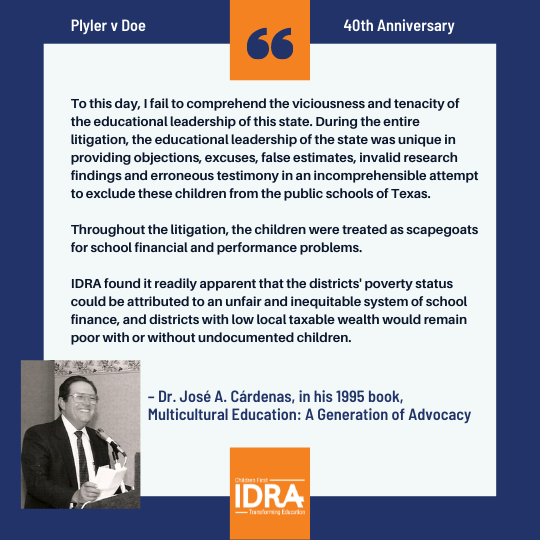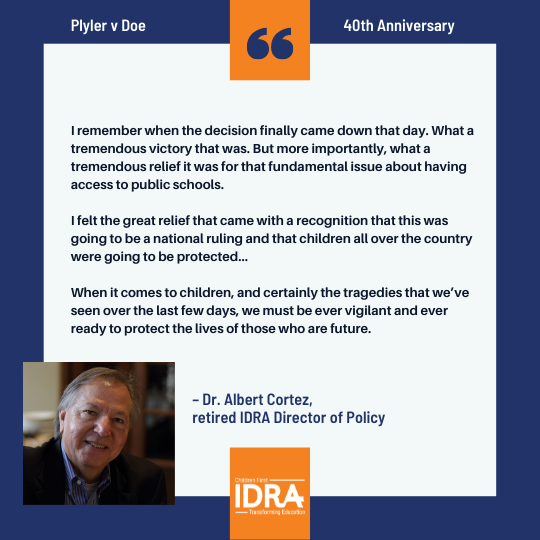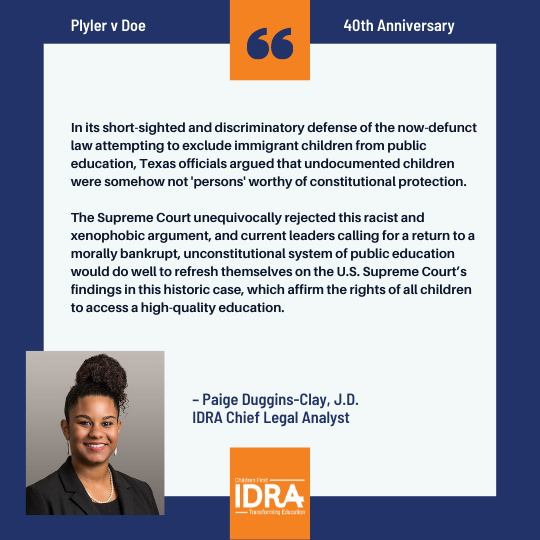In June 1982, the U.S. Department of Education ruled in Plyler v Doe that the right of undocumented students to attend public school is guaranteed. IDRA was involved in a number of the cases that led up to the Supreme Court case and has since helped schools protect the rights of immigrant students. Below are highlights of the case and the implications of the ruling.
Background
In one of those last-minute backdoor tricks, an amendment slipped through the Texas Legislature without debate in 1975 setting off a chain of events that shoved a specific selection of children out of school. Undocumented immigrant children were suddenly excluded from education.
In multiple school districts, with the help of advocates, brave parents took a stand, risking their own futures to secure that of their children.
 IDRA provided extensive information for one of the first court cases dealing with the education of undocumented children in Texas, Doe v. Plyler (1978) and others. IDRA founder, Dr. José A. Cárdenas served as an expert witness for the Mexican American Legal Defense and Educational Fund (MALDEF) during the trial in Tyler, and IDRA’s retired director of policy, Dr. Albert Cortez, testified in the Houston and Dallas court cases.
IDRA provided extensive information for one of the first court cases dealing with the education of undocumented children in Texas, Doe v. Plyler (1978) and others. IDRA founder, Dr. José A. Cárdenas served as an expert witness for the Mexican American Legal Defense and Educational Fund (MALDEF) during the trial in Tyler, and IDRA’s retired director of policy, Dr. Albert Cortez, testified in the Houston and Dallas court cases.
Then, on June 15, 1982, the U.S. Supreme Court ruled that public schools must serve all children, including undocumented students. The court concluded that denying students free enrollment in public schools based on immigration status violates the Equal Protection Clause of the 14th Amendment of the U.S. Constitution and Title IV of the Civil Rights Act of 1964.
The court said denying immigrant students enrollment in public schools creates a class of marginalized youth with limited opportunities for education and social advancement. Thus, federal law requires states to provide all children with equal access to public K-12 schools.
This decision is vital. As a result of the Plyler ruling, public schools may not:
- deny admission to a student during initial enrollment or at any other time on the basis of undocumented status;
- treat a student differently to determine residency;
- engage in any practices to “chill” the right of access to school;
- require students or parents to disclose or document their immigration status;
- make inquiries of students or parents intended to expose their undocumented status; or
- require social security numbers from all students, as this may expose undocumented status.
 And like other students, children of undocumented workers in fact are required under state laws to attend school until they reach a mandated age.
And like other students, children of undocumented workers in fact are required under state laws to attend school until they reach a mandated age.
Plyler v Doe at 40 – Schooling Guaranteed for Immigrant Children
See our new video interview launched on the 40th anniversary of Plyler v Doe featuring Dr. Albert Cortez, who testified in one of the cases in Texas. He sat down with IDRA chief legal analyst, Paige Duggins-Clay, J.D., to discuss the history of the case, the plaintiffs, the arguments, and the impact of the U.S. Supreme Court ruling. This interview is also available as a Classnotes Podcast.
Why does this matter for quality school programs?
 All students deserve access to high-quality public schools. Programs that support early literacy and academic success, such as early education and bilingual and special education, prepare students for the rest of their educational careers and beyond.
All students deserve access to high-quality public schools. Programs that support early literacy and academic success, such as early education and bilingual and special education, prepare students for the rest of their educational careers and beyond.
Plyler v. Doe supports high-quality schools by:
- protecting basic access for all students to enroll in school;
- promoting trust and safety among schools, students and families; and
- ensuring that all eligible children get the educational services they deserve.
What does threatening Plyler v. Doe mean for Texas students?
Some politicians have tossed around the idea of challenging the well-established laws from Plyler v. Doe despite its critical role in our educational and economic prosperity. Such a challenge means:
- denying children an education;
- discriminating against children based on their or their families’ citizenship; and
- creating an underclass of children without basic educational or economic opportunities.
But no governor – or president – can override this ruling.
What can you do to protect and promote high-quality schools for all children?
At IDRA, we are working to strengthen schools to work for all children, families and communities. Help us make this goal a reality for every child; we simply cannot afford the alternatives. Denying children of undocumented workers access to education is unconstitutional and against the law.
- Openly and vocally oppose efforts to challenge Plyler v. Doe and corresponding guidelines for equal educational access.
- Ensure all school leaders create welcoming environments for all children and their families.
- Support local and state policies that support safe and inclusive schools for students and teachers, including through inclusive curricula, investments in early education and bilingual education programs, and support for mental health and counseling staff who are knowledgeable of students’ and families’ rights.
- Share IDRA’s bilingual infographic, Welcoming Immigrant Students in School, which has more information on what schools can do.
School personnel – especially principals and those involved with student registration and enrollment – should be aware that they have no legal obligation to enforce U.S. immigration laws.
Learn More about Plyler v Doe
Happy Birthday Plyler & DACA – Check out the opportunities to take action and show your support for this important decision and program and the rights of all our children!, June 15, 2022
What you should know about Plyler, the case protecting undocumented students’ education rights, by Matt Barnum, Chalkbeat, May 11, 2022
Public Education for Immigrant Students: Understanding Plyler v. Doe
AFT’s Standing United: Protecting the rights of immigrant students and their families
Southern Poverty Law Center’s Plyler Resources for Educators, Families, and Advocates
MALDEF’s Plyler v. Doe Blog/Timeline of the Case and Documentary
MALDEF Statement on Texas Governor’s Comments on Landmark Education Ruling, May 5, 2022

